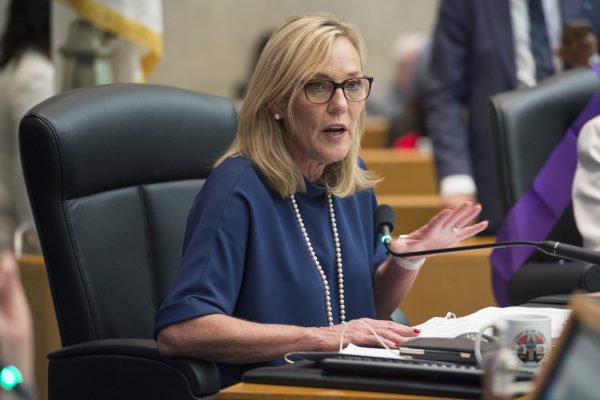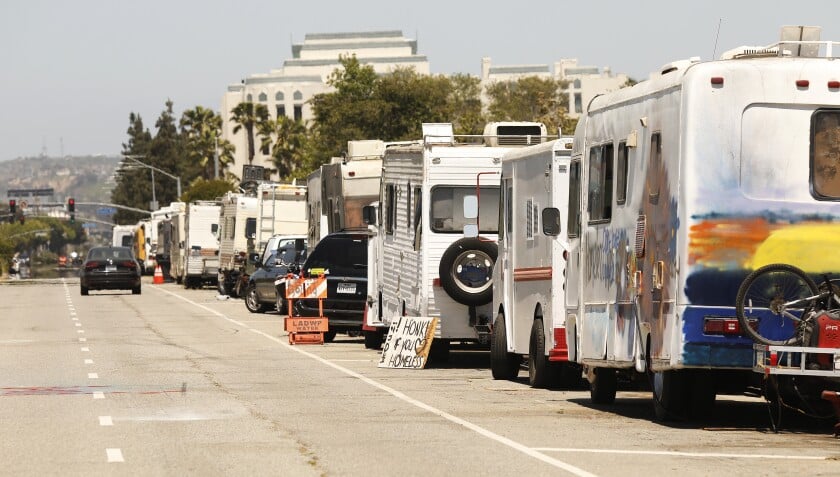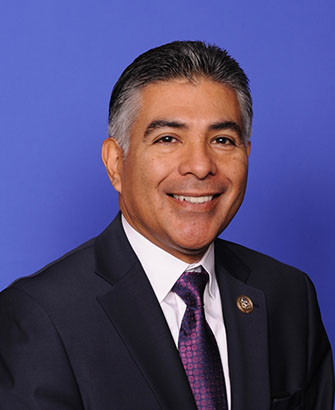As the first step in a months-long budget process for Los Angeles County, the Board of Supervisors gave preliminary approval Tuesday to a $38.5 billion recommended budget for fiscal year 2022-23.
The recommendation is $807 million less than the current fiscal year’s adopted budget, but $2.3 billion more than last year’s recommended budget. The budget process will continue with public hearings on May 11 and major adjustments will be made before the budget is ultimately finalized in October. The budget does not yet include anticipated state and federal funding.
“In these times of economic uncertainty, I know the CEO and our departments will do their best to leverage and maximize the amount of additional federal and state dollars we can use to serve our communities with dignity and equity,” Board of Supervisors Chair Holly Mitchell said.
“There’s lots of good news in this recommended budget. I also see opportunities in areas where we can make our budget a better reflection of our core values as a county and priorities identified by this board through motions,” she added.
County CEO Fesia Davenport released the budget recommendations Monday and presented them to the board on Tuesday.
“This budget brings to life the policy vision established by the Board of Supervisors and sets a course for the county to strengthen the programs and services we provide to millions of residents each and every day,” Davenport said in a statement Monday. “That means continuing to respond vigilantly to an evolving pandemic, while also ramping up to launch new departments focused on key populations and driving major changes in how we deliver services. It’s a dynamic time for Los Angeles County, and this recommended spending plan is intended to reflect that.”
The proposal foresees a positive economic outlook for the county, with property tax revenues expected to grow by 6% and sales tax revenues estimated to increase by nearly 8%. However, Davenport, who said Monday that the county is “cautiously optimistic,” warned of challenges and uncertainties, including inflation, labor negotiations, continuing impacts from COVID-19, litigation and an unstable geopolitical climate affecting gas prices and global markets.
Generally, the draft budget is divided into $12.985 billion for health-related services, $9.597 billion for public assistance, $9.461 billion for public protection, $5.737 billion for general services and other costs, and $737 million for recreation and culture.
The Sheriff’s Department is recommended to receive approximately $3.6 billion, roughly the same as the current fiscal year.
The draft budget also includes $493.3 million in Measure H funding to help with mental health resources and housing for people experiencing homelessness. The county’s homeless initiative team will give recommendations to the Board of Supervisors on how to spend the Measure H dollars.
The draft budget includes funding for a total of 513 new positions, bringing the total number of county jobs to 111,551. Most of the new positions are focused on public health, health and safety net services, including 116 new public health positions, 196 new critical care unit nurses and 41 new “street medicine” clinic positions.
It would also allocate $15.3 million for continued compliance with a federal consent decree governing conditions in the Men’s Central Jail, which the Board of Supervisors has committed to closing. The proposal also includes $12.3 million to expand sheriff’s academy classes and train a “new generation of deputies,” while continuing moves to rely more on mental-health professionals to respond to some incidents rather than law enforcement.
During Tuesday’s meeting, the supervisors called out several specific programs they were happy to see funded. Supervisor Kathryn Barger said she was particularly excited that the recommended budget includes funding for an expanded therapeutic van pilot program, which dispatches mental health experts to some nonviolent 9-1-1 calls.
“That is going to be a game changer, especially when you locate them in areas where there’s the greatest need of calls coming in for mental health services. The goal is to really provide compassionate care, and I believe that these are the right tool to do just that,” Barger said.
Also proposed is $100 million through Measure J for “community investments” and incarceration alternatives, and support for the county’s “Care First, Jails Last” program. In line with Measure J, the county aims to set aside the full 10% of its locally generated unrestricted revenue to support Care First and Community Investment programs by 2024.
Youth investments outlined in the recommended budget include $22.8 million for full-time child care for CalWORKS families, $15.7 million for the Youth@Work jobs program and $14.1 million for Department of Children and Family Services medical hub services.
Supervisor Hilda Solis spoke Tuesday about the Youth@Work program, which provides underserved people between the ages of 14 and 24 with work experience, training and supportive services.
“Ten thousand slots will be provided for young people. That, to me, is an incredible notion for the entire county of Los Angeles and we should be proud and insisting that our cities and our (community-based organizations) take advantage of this, including those that were so supportive of Measure J,” Solis said.
The supervisor invoked a quote by Homeboy Industries Founder Father Gregory Boyle, who said “nothing stops a bullet like a job.”
The county is also expected to introduce four new departments in the next fiscal year, which Davenport said “must be some kind of record, at least in modern county times.”
The new departments are the Justice Care and Opportunities Department, the Youth Development Department, the Aging and Disabilities Department and the Department of Economic Opportunity.
Supervisor Sheila Kuehl spoke about her excitement for the new departments, particularly the Department of Youth Development.
“This is a biggie,” she said, adding that the department “will be in a good position to re-imagine youth justice as envisioned by the board, by our commissions, by our committees and most especially by the young people that we have invited and appointed to participate.”
Kuehl also called for additional funding to the Office of Violence Prevention, which was created in 2018 following a motion by Kuehl. On Tuesday, she said the office “has shown great promise but never has really been adequately resourced” with ongoing funding.
“We need to fund this office so that we can support and expand the most effective violence prevention programs that can be developed in the county,” she said.
The draft budget also includes $188 million for water conservation projects, $1.6 billion for capital projects and $85.3 million to enhance and expand parks.
About $30 million would also go to public works projects, including paving roads and making improvements that impact traffic safety. Supervisor Janice Hahn said she was happy that the recommended budget includes funding for those kinds of quality of life projects.
“I know I’ve called (L.A. County Public Works Director Mark Pestrella) many times with concerns that my residents have brought up about dangerous roads and intersections, and his team works to respond and to fix those problems. Let’s make sure that he continues to have the funding that that department needs to meet the needs of our residents … so much of quality of life issues are right there with people’s roads and sidewalks,” Hahn said.
She also said she was happy the plan would keep public pools open through September and bring mobile health-care clinics to people who lack access.
The $38 billion is funded by several sources, including 22%, or $8.5 billion, from the state and 15%, or $5.8 billion, from the federal government. However, both state and federal revenues are tied to specific programs. The county also has $8.124 billion from charges for services, $8.3 billion from property taxes and $7 billion in other revenues.
After public hearings, deliberations will begin on June 27. The final budget will be adopted in October.







